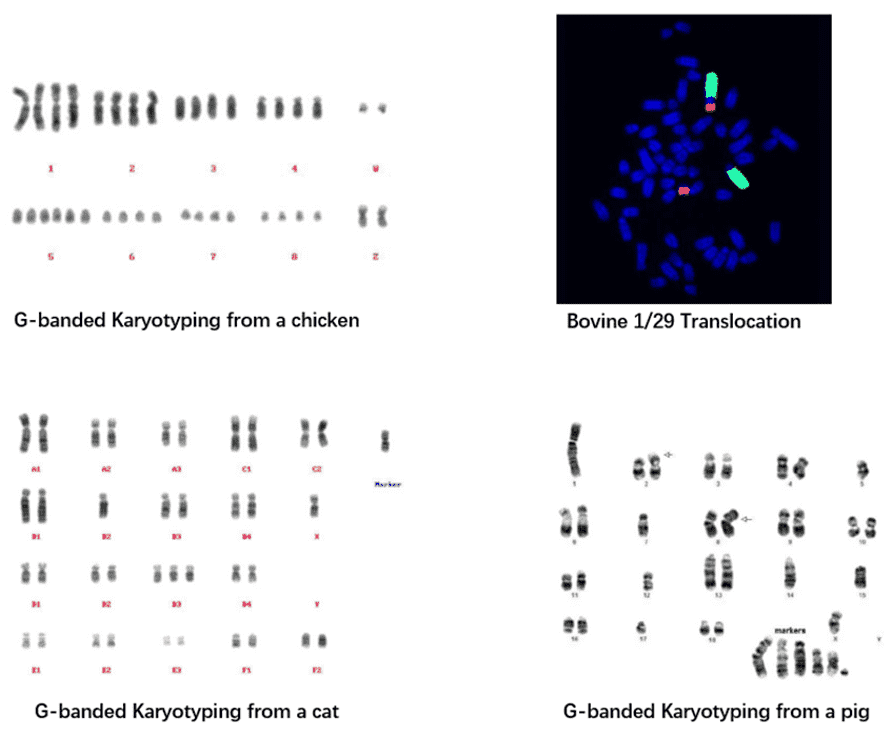- You are here: Home
- Services
- ISH/FISH Services
- Animal Chromosome Analysis (G-banded) Service
Services
-
Cell Services
- Cell Line Authentication
- Cell Surface Marker Validation Service
-
Cell Line Testing and Assays
- Toxicology Assay
- Drug-Resistant Cell Models
- Cell Viability Assays
- Cell Proliferation Assays
- Cell Migration Assays
- Soft Agar Colony Formation Assay Service
- SRB Assay
- Cell Apoptosis Assays
- Cell Cycle Assays
- Cell Angiogenesis Assays
- DNA/RNA Extraction
- Custom Cell & Tissue Lysate Service
- Cellular Phosphorylation Assays
- Stability Testing
- Sterility Testing
- Endotoxin Detection and Removal
- Phagocytosis Assays
- Cell-Based Screening and Profiling Services
- 3D-Based Services
- Custom Cell Services
- Cell-based LNP Evaluation
-
Stem Cell Research
- iPSC Generation
- iPSC Characterization
-
iPSC Differentiation
- Neural Stem Cells Differentiation Service from iPSC
- Astrocyte Differentiation Service from iPSC
- Retinal Pigment Epithelium (RPE) Differentiation Service from iPSC
- Cardiomyocyte Differentiation Service from iPSC
- T Cell, NK Cell Differentiation Service from iPSC
- Hepatocyte Differentiation Service from iPSC
- Beta Cell Differentiation Service from iPSC
- Brain Organoid Differentiation Service from iPSC
- Cardiac Organoid Differentiation Service from iPSC
- Kidney Organoid Differentiation Service from iPSC
- GABAnergic Neuron Differentiation Service from iPSC
- Undifferentiated iPSC Detection
- iPSC Gene Editing
- iPSC Expanding Service
- MSC Services
- Stem Cell Assay Development and Screening
- Cell Immortalization
-
ISH/FISH Services
- In Situ Hybridization (ISH) & RNAscope Service
- Fluorescent In Situ Hybridization
- FISH Probe Design, Synthesis and Testing Service
-
FISH Applications
- Multicolor FISH (M-FISH) Analysis
- Chromosome Analysis of ES and iPS Cells
- RNA FISH in Plant Service
- Mouse Model and PDX Analysis (FISH)
- Cell Transplantation Analysis (FISH)
- In Situ Detection of CAR-T Cells & Oncolytic Viruses
- CAR-T/CAR-NK Target Assessment Service (ISH)
- ImmunoFISH Analysis (FISH+IHC)
- Splice Variant Analysis (FISH)
- Telomere Length Analysis (Q-FISH)
- Telomere Length Analysis (qPCR assay)
- FISH Analysis of Microorganisms
- Neoplasms FISH Analysis
- CARD-FISH for Environmental Microorganisms (FISH)
- FISH Quality Control Services
- QuantiGene Plex Assay
- Circulating Tumor Cell (CTC) FISH
- mtRNA Analysis (FISH)
- In Situ Detection of Chemokines/Cytokines
- In Situ Detection of Virus
- Transgene Mapping (FISH)
- Transgene Mapping (Locus Amplification & Sequencing)
- Stable Cell Line Genetic Stability Testing
- Genetic Stability Testing (Locus Amplification & Sequencing + ddPCR)
- Clonality Analysis Service (FISH)
- Karyotyping (G-banded) Service
- Animal Chromosome Analysis (G-banded) Service
- I-FISH Service
- AAV Biodistribution Analysis (RNA ISH)
- Molecular Karyotyping (aCGH)
- Droplet Digital PCR (ddPCR) Service
- Digital ISH Image Quantification and Statistical Analysis
- SCE (Sister Chromatid Exchange) Analysis
- Biosample Services
- Histology Services
- Exosome Research Services
- In Vitro DMPK Services
-
In Vivo DMPK Services
- Pharmacokinetic and Toxicokinetic
- PK/PD Biomarker Analysis
- Bioavailability and Bioequivalence
- Bioanalytical Package
- Metabolite Profiling and Identification
- In Vivo Toxicity Study
- Mass Balance, Excretion and Expired Air Collection
- Administration Routes and Biofluid Sampling
- Quantitative Tissue Distribution
- Target Tissue Exposure
- In Vivo Blood-Brain-Barrier Assay
- Drug Toxicity Services
Animal Chromosome Analysis (G-banded) Service
- Service Details
- Features
- Applications
- FAQ
- Explore Other Options
G-banding analysis represents a foundational technology in cytogenetic research. Trypsin treatment followed by Giemsa staining produces a visible chromosome banding pattern under a microscope which enables detection of numerical chromosome anomalies such as aneuploidy and polyploidy together with structural changes like translocation, inversion, and deletion. These abnormalities correlate strongly with reproductive disorders and developmental malformations in animals while also leading to hereditary diseases and population degradation.
Our service is dedicated to providing high-quality chromosome analysis for research institutions, breeding companies, and biotechnology enterprises. Our team possesses deep chromosome analysis experience with multiple species such as humans, mice, rats, pigs, sheep, cows, chickens, hamsters, dogs, elephants, dolphins, salmon and insects and has developed adult and embryonic stem cell lines. Additionally, our customized chromosome analysis services are developed to meet your exact requirements so you can build sound research and development projects on a dependable foundation.
 Fig. 1. Karyotype generated from chicken, bovine, cat and pig cells.
Fig. 1. Karyotype generated from chicken, bovine, cat and pig cells.
Creative Bioarray's Animal Chromosome Analysis (G-banded) Service
Workflow
1
Sample Collection
We support a variety of sample types, including peripheral blood, bone marrow, tissues, and embryonic stem cells. Professional guidance for sample collection is available.
2
Cell Culture
For live cell samples, we conduct proper culturing to obtain an adequate number of metaphase cells.
3
Chromosome Harvesting
Meticulously timed to ensure peak mitotic activity, harvesting prepares chromosomes for subsequent analysis.
4
G-banding Preparation
Chromosomes are stained to reveal characteristic band patterns.
5
Microscopic Imaging and Analysis
We examine 30-40 metaphase cells, analyze chromosome number and structural abnormalities, and produce standardized karyotype images.
Species
- Humans (adult and embryonic stem cell lines)
- Laboratory animals (such as mice, rats, hamsters)
- Livestock and pets (such as cows, pigs, sheep, horses, dogs, cats)
- Wildlife animals (such as elephants, dolphins, salmon)
- Insects
Detections
- Chromosomal number abnormalities (such as aneuploidy, polyploidy)
- Chromosomal structural abnormalities (such as deletions, duplications, inversions, translocations)
- Sex chromosome analysis
- Karyotype analysis for specific species
Deliverables
- A high-resolution set of chromosome G-banded images.
- A detailed karyotype analysis report, including chromosome numbers, morphology, banding characteristics, and potential variance information.
Features

Multi-Species Experience
We support chromosome analysis in a wide variety of animal species, including those with complex karyotypes and rare species.

Customized Services
Offering personalized chromosome analysis plans tailored to customers’ specific needs.

Rapid Turnaround
Standard service reports are delivered within 7-10 business days, with expedited service available for quicker delivery.

Comprehensive Support
Our support team guides you through each phase of the process from sample collection until final report interpretation.
What can You do with Our Animal Chromosome Analysis (G-banded) Service?
Our services support a wide range of applications:
- Animal Breeding and Reproduction: Screen for chromosome translocation carriers to reduce genetic defect transmission and enhance reproductive efficiency.
- Disease Model Development: Assess gene-edited animal models (such as those modified by CRISPR) for chromosomal stability to maintain experimental dependability.
- Endangered Species Conservation: Examine wildlife chromosomal diversity to inform the development of effective conservation strategies.
- Reproductive Health Research: Identify chromosomal defects that lead to animal infertility to enhance reproductive treatment approaches.
- Cell Line Quality Control: Evaluate genetic stability in stem cells or tumor cell lines, preventing experimental deviation.
FAQ
1. What types of samples are required?
We accept various types of samples, such as blood, bone marrow, and skin tissues. Please ensure samples are fresh and sterile. Refer to our sample collection guide or contact our technical support team for specific collection methods.
2. Which animal species' chromosome analysis do you support?
Our service supports chromosome analysis for many animal species which include humans, mice, rats, pigs, sheep, cows, chickens, hamsters, dogs, elephants, dolphins, salmon among others in addition to various insects. Please contact us to confirm requirements for specific species.
3. What types of chromosomal abnormalities can G-banding analysis detect?
G-banding technology identifies both numerical chromosome abnormalities including aneuploidy and polyploidy as well as structural chromosome alterations like deletions and translocations. Further analysis of subtle variations requires combining G-banding with additional techniques such as FISH or sequencing.
4. What is the service timeline?
Typically, the service timeline is 7-10 business days from receiving qualified samples. However, the timeline may extend due to sample quality issues or specific experimental requirements. We will communicate promptly with customers.
Explore Other Options
For research use only. Not for any other purpose.

